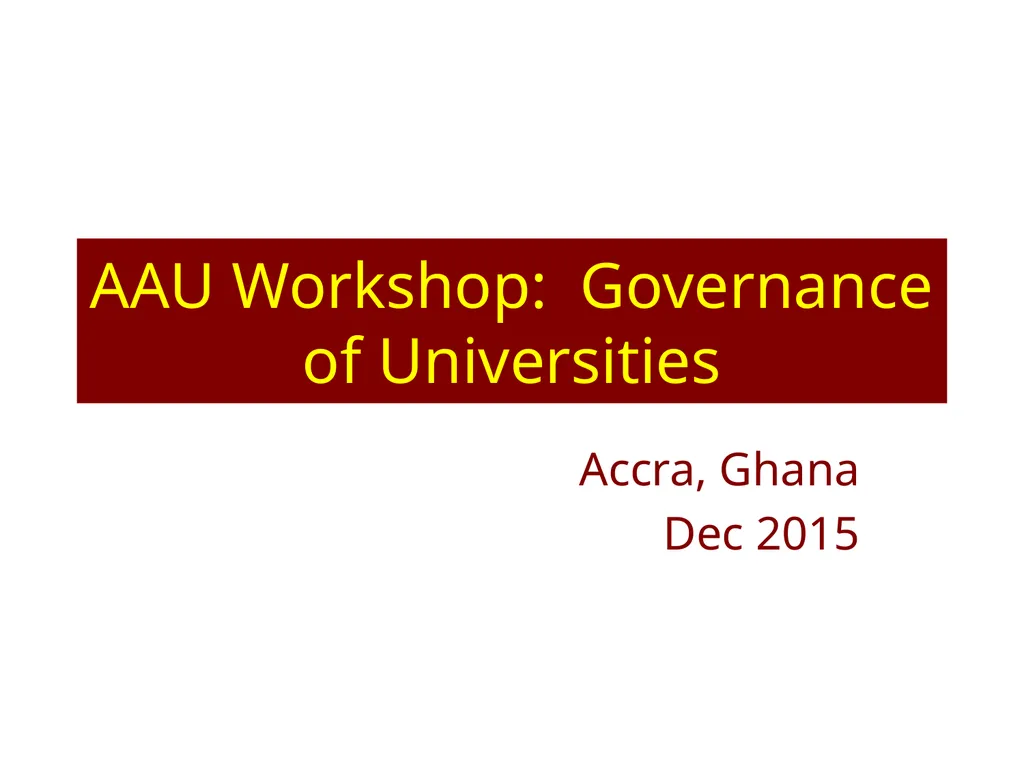AAU Workshop: Governance of Universities Accra,
Author : mitsue-stanley | Published Date : 2025-06-23
Description: AAU Workshop Governance of Universities Accra Ghana Dec 2015 Our programme final programme will be distributed closer to the date Some key concepts Institutional autonomy Academic freedom Accountability Authority Responsibility
Presentation Embed Code
Download Presentation
Download
Presentation The PPT/PDF document
"AAU Workshop: Governance of Universities Accra," is the property of its rightful owner.
Permission is granted to download and print the materials on this website for personal, non-commercial use only,
and to display it on your personal computer provided you do not modify the materials and that you retain all
copyright notices contained in the materials. By downloading content from our website, you accept the terms of
this agreement.
Transcript:AAU Workshop: Governance of Universities Accra,:
AAU Workshop: Governance of Universities Accra, Ghana Dec 2015 Our programme (final programme will be distributed closer to the date) Some key concepts Institutional autonomy Academic freedom Accountability Authority Responsibility Transparency Alignment Governance Access Relevance Quality Success Optimal M-E-I flow Corporate Governance – a definition The system by which corporate entities: exercising accountability to shareowners and responsibility to stakeholders are directed and controlled to achieve sustainable improvement in shareowner prosperity (KPMG) Key considerations for HEIs Can HEIs be classified as ‘corporate entities? Who are their key shareowners? How does the goal of shareowner prosperity applies to HEIs? Is governance in its most fundamental form different to an appropriate ‘enlightened self-interest’? Does sound HEI governance build on the principles of Integral theory? (Epistemology) Expansiveness/inclusive shareholders/stakeholders perspective Expansiveness of HEI’s worldview Ontological levels of behavior Governance: a multi-element perspective Governance: Multi-element definition Governance: Systemic perspective The ‘why is’ question The ‘how well is’ question The ‘what is’ question The ‘how is’ question (dynamic multi-directional MEI flow – M= flow of matter, E= flow of energy (normative and strategic leadership), I= flow of information) (Rothhaermel, 2013) Sound governance: a prerequisite for Sustainable Competitive Advantage University, Organization, Governance and Competitiveness (PPT 10-12: Lombardi, Craig, Capaldi & Gater, Aug 2002))PP Community engagement Embedded in a broader institutional context…. (Lombardi, Craig, Capaldi & Gater, Aug 2002) Institution embedded in macro systems context M E I At the heart of it all: ensure sustained composite quality Fundamental The dynamic tension between institutional autonomy and academic freedom Where is the tipping point: is it benefiting to and rewarding for society to allow HEI institutions to govern themselves and to decide on the central questions: Who to teach What to teach How to teach When to teach (based on SASCO Discussion document, 2009) Institutional autonomy High degree of self –regulation and administrative independence with respect to: student admissions, curriculum, methods of teaching & assessment, research, establishment of academic regulations and the internal management of resources generated from private and public sources (Higher Education White Paper, 1997) Institutional Autonomy implies… Freedom of government regulation iro: Internal organization Its governance Internal management of financial resources In generation of income from non-public sources Recruitment and appointment of its staff Conditions of study Its teaching and research Summarized: HEI’s should be autonomous from government and political control Question: Autonomy from business, donors, sponsors and other sectors of society? (Higher Education White Paper, 1997)














